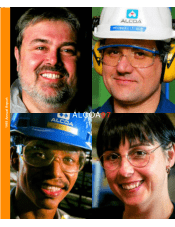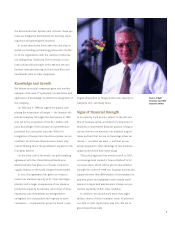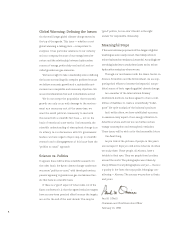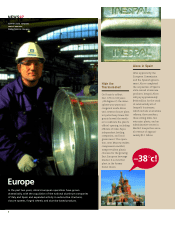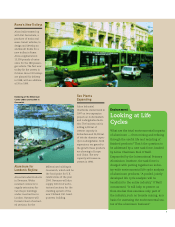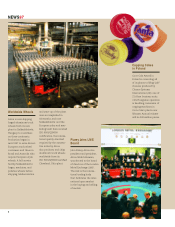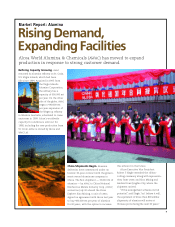Alcoa 1997 Annual Report Download - page 6
Download and view the complete annual report
Please find page 6 of the 1997 Alcoa annual report below. You can navigate through the pages in the report by either clicking on the pages listed below, or by using the keyword search tool below to find specific information within the annual report.
4
Global Warming: Defining the Issues
On the world stage, global climate change moved to
the top of the agenda. This issue — whether or not
global warming is taking place —is important to
everyone. It has particular relevance to our industry
and our company because of our energy intensive
nature and the relationship between hydrocarbon
sources of energy, particularly coal and oil, and so-
called greenhouse gas emissions.
We have sought to take a leadership role in defining
the issues surrounding this complex problem because
we believe economic growth and a sustainable envi-
ronment are compatible and necessary objectives. We
are environmentalists first and industrialists second.
We do not accept the proposition that economic
growth can only occur with damage to the environ-
ment as a necessary cost. At the same time, we
want the world political community to deal with
this issue from a scientific fact base — not on the
basis of emotional scare tactics. Unfortunately, the
scientific understanding of atmospheric change is in
its infancy. In our discussions with U.S. government
leaders, we have urged a major step-up in scientific
research and a disengagement of this issue from the
“politics as usual” approach.
Science vs. Politics
It appears there will be more scientific research. On
the other hand, the Kyoto climate change conference
was more “politics as usual,” with developed nations
present agreeing to greenhouse gas containment lev-
els that have no scientific basis.
If there is a “good” aspect of what came out of the
Kyoto conference it is that the agreed emission targets
have no near-term practical effect because the targets
are set for the end of the next decade. This may be
“good” politics, but we don’t think it is the right
answer for responsible citizenship.
Meaningful Steps
If the most extreme proponents of the dangers of global
warming are even nearly correct, then timely action to
reduce hydrocarbon emissions is essential. Accordingly, we
are taking initiatives to study these issues and to reduce
hydrocarbon emissions where we can.
Through our involvement with the Heinz Center on
Science, Economics and the Environment, we are sup-
porting their efforts to become the impartial, nonpo-
litical source of facts regarding global climate change.
As a member of the International Primary
Aluminium Institute, we have agreed to chair a com-
mittee of members to create a scientifically “bullet-
proof” life cycle analysis of the industry’s products.
And, within Alcoa, we have established a process
to examine every aspect of our energy utilization to
determine where and how we can further reduce
energy consumption and atmospheric emissions.
These issues will be with us for the foreseeable future.
One final thing.
As you look at the pictures of people in this year’s
annual report I hope you will notice what we do when
we study them. These people, all Alcoans, have a
twinkle in their eyes. They are people from locations
around the world. The photographs were taken by
many different local photographers and yet — there is
a quality in the faces that says pride, belonging, con-
tributing — Alcoans. The success we produce is theirs
and yours.
Paul H. O’Neill
Chairman and Chief Executive Officer
February 16, 1998

